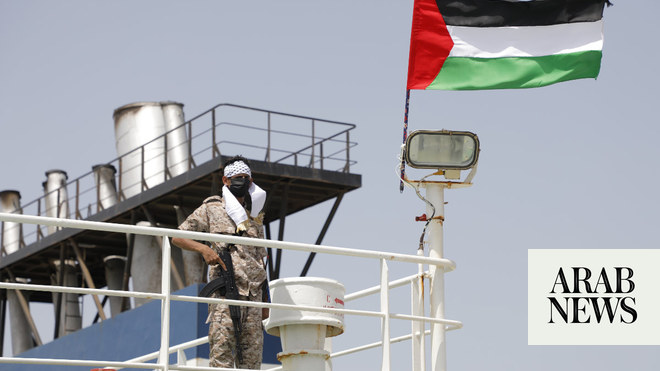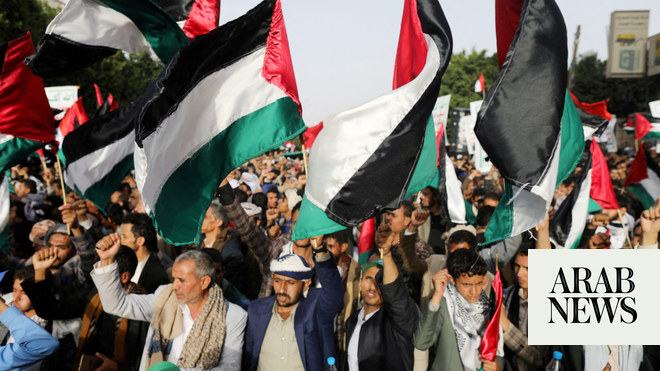
While the assassination of Quds Force commander Qassem Soleimani has unleashed anger, turmoil and uncertainty in Iran, Iraq and the US, the chances are that Yemen will also stand to be affected by his death. With Iran vowing to avenge the killing of Soleimani by attacking US strategic interests and possibly America’s allies, it will undoubtedly turn to the Houthis to answer the call.
Although Soleimani might have never visited Yemen, or even met with the leader of the Houthi militia, Abdul-Malik Al-Houthi, the latter pledged to avenge the “martyr” and vowed that his blood “will not be wasted.” On Monday, the Houthis organized a rally, in which crowds carried pictures of Soleimani and Abu Mahdi Al-Muhandis, the Iraqi Hashd leader who died with him. The rally condemned the US airstrike and called for an end to the American intervention in the region.
The Houthi rhetoric around avenging Soleimani’s death is worrying, not only because it risks entangling the group in the Iranian regime’s quest for a vendetta against the US, but also because it risks causing further instability by crushing the prospects of a negotiated peace settlement for Yemen as well as between Yemen and its neighbors.
The relationship between the regime in Tehran and the Houthi militia has often been underestimated and misunderstood. Much of this was because Iran preferred to support the Houthis covertly, hiding behind plausible deniability for its malign actions in Yemen.
Although Soleimani was not a household name in Yemen in the same way he was in Iraq or Lebanon, he played a critical role in advancing Iranian interests there and ensuring the Houthis maintained their power by training them in unconventional methods, connecting them with the militias in the region, and giving them experience in asymmetrical warfare — tactics that he was all too familiar with. Soleimani left a cadre of militiamen from both the Islamic Revolutionary Guard Corps and Hezbollah to train the Houthis, chief among them being Quds Force commander Abdul Reza Shahla’i, who is wanted by the US Department of Justice and is currently operating with the Houthi militia in Sanaa.
Undoubtedly, Soleimani’s tactical and strategic talent boosted the position and stature of the Houthis in Yemen by developing their military expertise, providing political strategy, and supplying them with Iran’s latest weaponry. As a mastermind devoted to serving his country’s nationalistic and expansionist objectives, Soleimani ensured that the Houthis had the means by which they could remain in power, including through UN-sponsored peace processes, which the Houthis meticulously negotiated.
For his efforts and support, the Houthi leadership treated him with a great sense of gratitude and loyalty. They fulfilled his vision by becoming one of the main players in the “Axis of Resistance” network, which is made up of a transnational alliance of pro-Iranian militias in Palestine, Iraq, Lebanon and Syria. The problem, however, is that this alliance regards the West and all of its affiliates as a coalition that needs to be expelled. This does not stop at the US or Israel, but rather includes Saudi Arabia and the UAE due to their cooperation with the US.
This strict ideology, which the Houthis have endorsed, jeopardizes any opportunities for peace and reconciliation within Yemen and the region. It is difficult to see the Houthis seeking genuine peace within the country or with Saudi Arabia while they continue to endorse a belief system that is based on the idea of overthrowing the existing order in the Arabian Peninsula and replacing it with a geopolitical alliance and sectarian doctrine that is absolutist in nature.
Although Soleimani might have never visited Yemen, or even met with the leader of the Houthi militia, Abdul-Malik Al-Houthi, the latter pledged to avenge the “martyr” and vowed that his blood “will not be wasted.”
Fatima Abo Alasrar
Ironically, the Houthis have always boasted that their movement is sovereign, claiming that their internal affairs are free from foreign interference. In reality, however, they are pursuing objectives that serve their Iranian patrons and not their own people.
Under these circumstances, finding a peace agreement will be difficult if the international community does not acknowledge the obstacles that stand in the way of a resilient peace process. To be able to negotiate peace amid the current toxic attitude of revenge, the UN will have to address the challenges in the Houthis’ ideological dogma and acknowledge the excessive influence that Iran covertly exerts on the Houthis. It is paramount that the UN mitigates these challenges in order to achieve a realistic idea of how peace can be secured while one side is under the influence of a reckless spoiler.
Overall, the UN special envoy to Yemen will have to work twice as hard as he did last year to ensure that the Houthis do not escalate their conflict with Saudi Arabia as a result of Soleimani’s death. Ultimately, the Houthis will need to make a decision on whether they want to remain a militia with a narrow vision and objectives or a state actor with a Yemeni identity, capable of governing their country. This will be the ultimate test of their sovereignty and independence.
Fatima Abo Alasrar is a Non-Resident Scholar at the Middle East Institute in Washington. Twitter: @YemeniFatima
Disclaimer: Views expressed by writers in this section are their own and do not necessarily reflect Arab News" point-of-view











